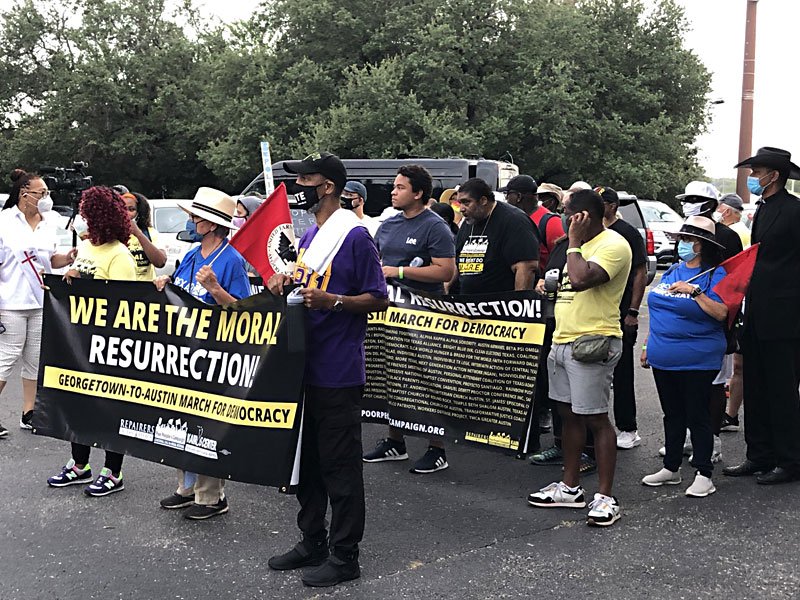Marching for Democracy, From Georgetown to Austin
Refusing to take even one step back
By Mike Clark-Madison, Fri., July 30, 2021

From Georgetown to Austin – 27 miles as the crow flies – is only half the distance between Selma and Montgomery in Alabama, but it's long enough for what the organizers of the four-day Moral March for Democracy hope to accomplish through direct action to create a path forward for protecting Texans' and Americans' voting rights. "We know that a seed cast in good soil can always produce more," the Rev. Dr. William J. Barber II told organizers, marchers, and media assembled on the eve of the march Tuesday, July 27, at Georgetown's Christ Lutheran Church. "This is a seed. What we're doing is full of substance."
Barber, the North Carolinian leader of the Poor People's Campaign and the Moral Mondays movement, may be America's most prominent civil rights leader at the moment, aside from those who remain with us from the Movement whose direct action in March 1965 gave this week's Texas event its template. The march here is "like Selma, in the sense that it's connecting voting rights and economic injustice," Barber said. The Poor People's Campaign is using direct action events all summer, all across the country, to demand not only protections of American's voting rights, but also a $15/hour federal minimum wage and permanent protections for the nation's 11 million unauthorized immigrants.
"And in the sense that Selma called all people, regardless of race, creed, and color to stand up," Barber continued. (This was ostensibly a response to a reporter's question, but with Barber, a great improvising preacher, on the mic, the crowd knew what to say: "Stand up!") "And thirdly, in the sense that the Selma march said you can't litigate your way out of this state by state. You can't simply mobilize more people to the polls, state by state. You must have federal action. That's the symbolism – that we're calling for federal action to stop what's happening in this state's legislature. The day the For the People Act gets passed, everything that the Texas Legislature is doing becomes illegal."
Dozens of political figures, religious leaders, and civil rights activists will bring their flocks and movements onto the hot pavements of Austin this week; in addition to Barber and his PPC co-chair Rev. Liz Theoharis, there's participation from the Rainbow PUSH Coalition, whose founder the Rev. Jesse Jackson was scheduled to join marchers Wednesday; Dallas' Frederick Haynes and Houston's James Dixon; and partner groups such as Workers Defense Action Fund, ADAPT, and Texas Right to Vote. And there's the man Barber calls "beloved brother Beto."
O'Rourke's Powered by People grassroots political action committee is lending a hand with the march, but the former congressman and U.S. Senate and presidential candidate tried to take a spot as just one of the crowd, even as speculation that he may launch a race to unseat Gov. Greg Abbott continues to burble. The voting rights battle this summer comes first, he says. "We need to bring greater attention and urgency to this fight to pass the For the People Act," O'Rourke told the Chronicle last week. "And frankly, we need the full attention of the president. The Texas House Democrats have taken this to the next level and are forcing people in Washington to acknowledge the sacrifice they're making, away from their families, maybe losing their jobs, or facing arrest." This week's march has that same potential, he thinks, "to engage the conscience of the country in a way the typical political theatre doesn't have the power to do."
What happened in Selma, you may be aware, was not just a messaging exercise; the violence that thwarted the initial marches prompted the nation's leaders to throw their weight behind what became the Voting Rights Act. "There may be those who try to intimidate or physically threaten the marchers along the way," as O'Rourke put it, although unlike in 1965 Alabama, law enforcement is not blocking their path. The marchers left Georgetown early Wednesday morning with a significant police presence, which handed them off to Round Rock officers at midday along the I-35 frontage road.
The actual number of marchers at any given point has been capped due to COVID concerns, and groups are being rotated in shifts; all participants on Wednesday were asked to show their proof of vaccination. But Barber also was firm with journalists that the numbers don't matter; the prior evening, he pointed out that this march and all of PPC's events in its summer of direct action are force-multiplied by technologies not available to the movement in Selma, or earlier. "Harriet Tubman got 700 people out of slavery but she never had Instagram," he said. "They did more with less."
On Wednesday, as marchers filed three-by-three, six feet apart, from the Christ Lutheran campus, Barber – who has a spinal disease and walks with a cane – set a resolutely slow pace with his call-and-response. A solitary "Trump 2020" flagbearer streaked in the opposite direction, less focused on intimidation than on getting into the shot of the many news cameras on scene. O'Rourke, eschewing the marchers' yellow T-shirts for his typical uniform – blue button-down, khakis, sturdy walking shoes, baseball cap, breakfast taco – brought up the rear.
The Moral March for Democracy departs from Good Hope Baptist Church in Round Rock today (Thu., July 29), and on Friday from the North Austin Muslim Community Center, ending at University Baptist Church on the Drag. Saturday will feature a brief march Downtown before a 10am rally at the Texas State Capitol, where all are encouraged to attend and observe COVID protocols. See more details on how to join the march with this story online, or at action.poorpeoplescampaign.org.
Got something to say on the subject? Send a letter to the editor.








